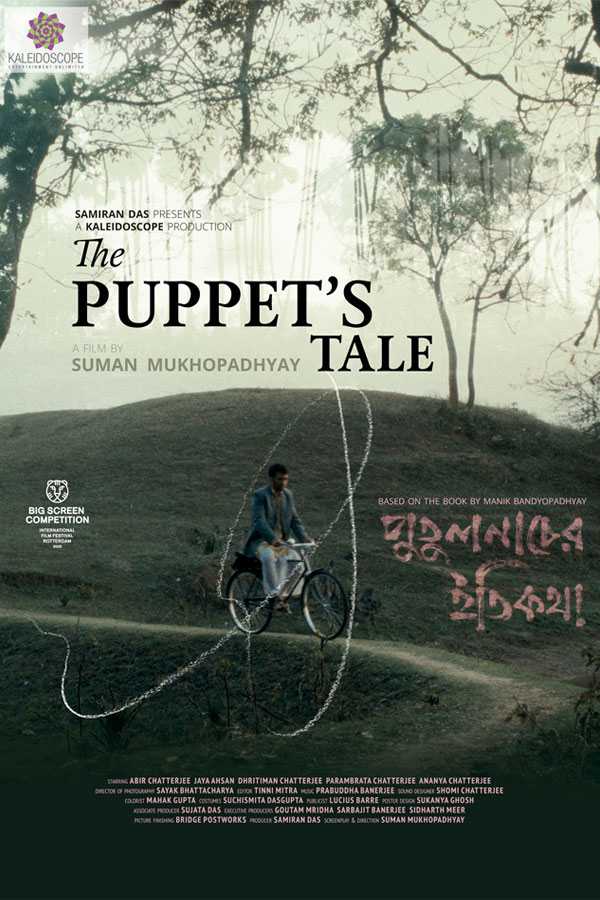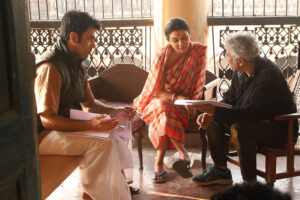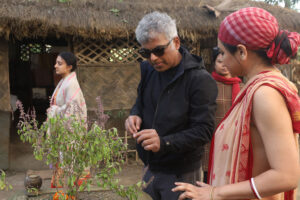Visit Us
- 1st Floor, PrakashJyoti Apartment,
188/1B, Manicktala Main Road,
Kolkata–700054 - contact@kicpl.in

Visit Us
- 1st Floor, PrakashJyoti Apartment,
188/1B, Manicktala Main Road,
Kolkata–700054 - contact@kicpl.in
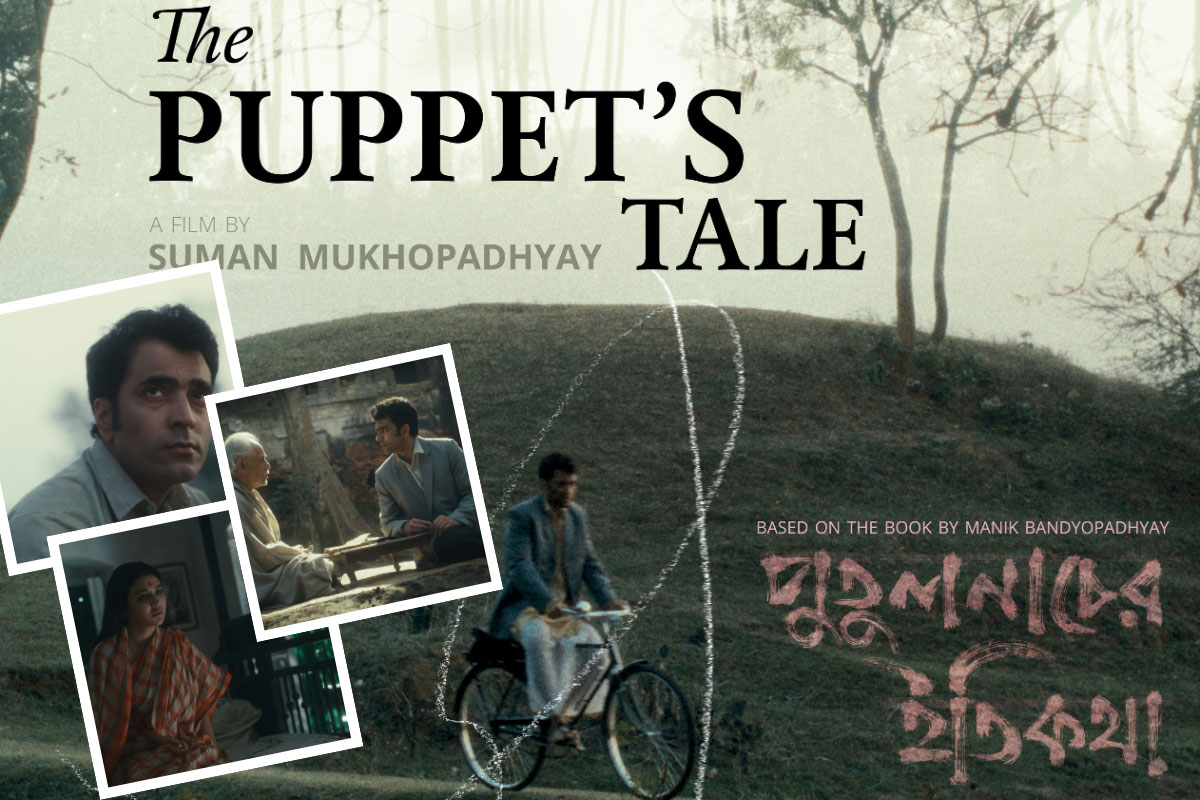
Putul Nacher Itikotha
Kaleidoscope’s upcoming Bengali feature film, Putulnacher Itikotha, will have its world premiere at the International Film Festival of Rotterdam in February 2025 as part of the Big Screen Competition. Scheduled for release later in 2025, the film is adapted from Sri Manik Bandopadhyay’s novel. Set in rural Bengal, it delves into the rich tapestry of village life, focusing on diverse individuals and their struggles, while sensitively exploring the complex dynamics of gender relations.
Putul Nacher Itikotha
পুতুলনাচের ইতিকথা
A film by Suman Mukhopadhyay
Main Cast
Abir Chatterjee: Shashi, Jaya Ahsan: Kusum, Dhritiman Chatterjee: Jadav Pundit, Parambrata Chatterjee: Kumud, Ananya Chatterjee: Sendidi
Main Crew
Novel: Manik Bandyopadhyay, Screenplay & Director: Suman Mukhopadhyay, Producer: Samiran Das, Associate Producer: Sujata Das, Executive Producers: Goutam Mridha, Sarbajit Banerjee, Sidharth Meer (Bridge Postworks), Cinematographer: Sayak Bhattacharya, Editor: Tinni Mitra, Music: Prabuddha Banerjee, Sound Designer: Shomi Chatterjee, Colorist: Mahak Gupta, Costumes: Suchismita Dasgupta
TECH SPECS
Running Time: 119 mins, Aspect Ratio: 1.85:1, Sound: 5.1, Shooting Format: Digital 4K, Languages: Bengali, Production Country: India, Production Company: Kaleidoscope
World Sales
Kaleidoscope – Samiran Das
+91 98303 39493. samiran@kicpl.in
Prakash Jyoti, 188/1 B, Maniktala Main Rd, Scheme VI-M, Kadapara, Phool Bagan,
Kankurgachi, Kolkata, West Bengal 700054
Publicist
Lucius Barre
+1 917 353 2268. luciusbarre@gmail.com
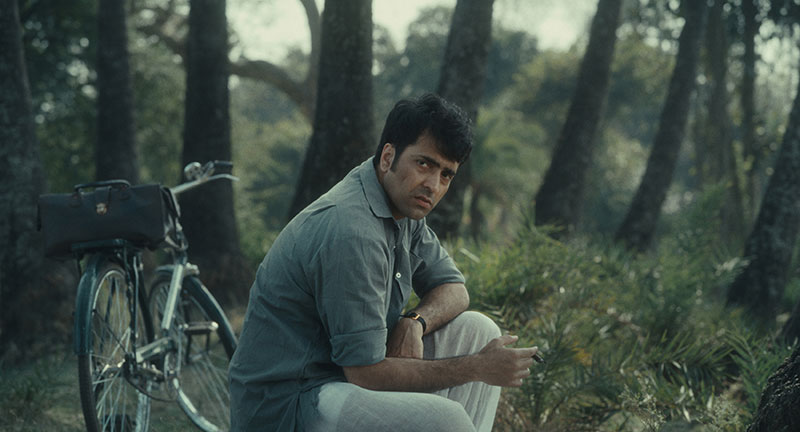
Logline
Shashi, a doctor trained in Kolkata is mired in his obscure village practice, as he dreams of fulfilment back in the city.
Synopsis
Shashi, a doctor trained in Kolkata, is mired in his obscure village practice, as he dreams of fulfilment back in the city. He lives alone in his ancestral house and navigates relationships with women both shamelessly flirtatious and deeply needy. The return of his city-friend who marries a village girl intensifies Shashi’s trapped existence. His closest bond, with Jadav Pundit, is strained by clashes over ancient theology and modern science. When Jadav stages his own death, Shashi’s inner turmoil spirals further. Despite his attempts at village reform, Shashi finds little success and feels increasingly trapped.
Long Synopsis
Shashi knows the people of the obscure village of Gaudia intimately; it’s where he grew up before attending medical college in Kolkata. Even as he is well-respected within his home community, he yearns to return to the cultured life of the city and pursue higher studies abroad. He lives with his widowed father, Gopal, who wishes for him to conform and settle down in the village. Meanwhile, Kusum, a married woman, shamelessly flirts with him, while whispers circulate about his close attention to Sendidi, a woman struggling with her mundane existence.
Among those in Shashi’s life, he feels a special bond with Jadav Pundit, a wise man and champion of ancient Indian theology. Shashi holds a deep respect for him, though they often disagree.
When Kumud, a college friend from Kolkata, arrives as the lead actor in an itinerant folk theatre company, he quickly falls for a village girl named Moti and asks Shashi to help him win her hand. Shashi is puzzled; how could Kumud, once a hero of his youth, find happiness with a simple girl? Kumud insists that he can mold Moti into his ideal partner, and though Shashi agrees to facilitate the marriage, he declines to follow Kumud’s advice to get married himself.
Jadav Pundit urges Shashi to study theology under his guidance, but Shashi resists. Frustrated, Jadav Pundit predicts that his life will end on the day of the upcoming Chariot Festival. Shashi shares this prediction with a neighbor, leading to a wave of faithful followers gathering in Jadav Pundit’s courtyard for a celebratory death watch.
As families continue to abandon the village, Shashi grows increasingly alienated and isolated. Kusum departs, and soon after, even Shashi’s father, Gopal, leaves as well. Amidst this exodus, the village also tallies several unfortunate deaths. Meanwhile, in the wake of the Japanese bombardment of Kolkata, newcomers begin to arrive, seeking refuge in Gaudia.
Shashi finds his hopes of returning to city life slipping away, as the options he once considered viable diminish. Yet, despite the encroaching despair, his dreams refuse to fade, lingering like a distant light in the darkness.
About the Cast
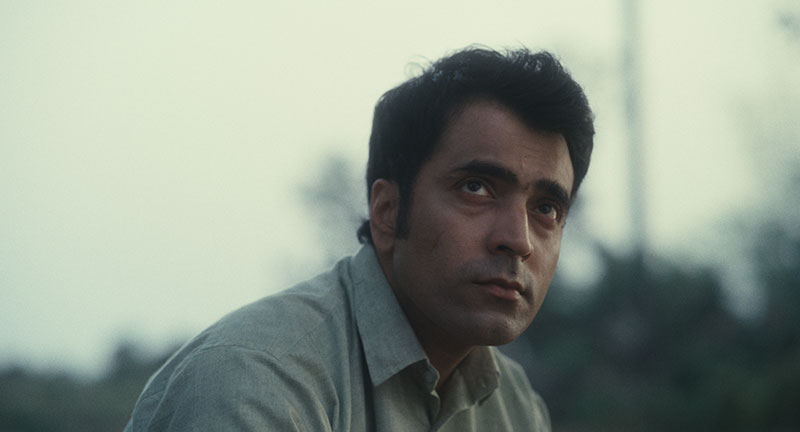
Abir Chatterjee: With a film career spanning over 15 years, Abir Chatterjee is a prominent name in the world of entertainment. He is the leading face of multiple hit franchises with roles like “Byomkesh” and “Subarno Sen”. His national ventures include the film “Kahaani” and the web series “Avrodh (Season 2)”.
Jaya Ahsan: For more than two decades Jaya Ahsan has been one of the most celebrated actresses of Bangladesh and Indian Bengali cinema. She is the only Bangladeshi actor who has won four Filmfare Awards and five National Film Awards. Her important films are Bijoya, Bishorjan, Binishutoy, and Robibaar. She produced movies like OCD and Kalantar in India and jointly produced an Iranian movie Fereshte. She has attended numerous film festivals with her films including Cannes, and Fajr International Film Festival.
Dhritiman Chatterjee: Dhritiman commenced his film acting career in 1970 as the protagonist of Satyajit Ray’s Pratidwandi (The Adversary). Most of his acting work has been in the parallel or independent cinema in India, with filmmakers such as Satyajit Ray, Mrinal Sen, Aparna Sen, Sanjay Leela Bhansali and Shoojit Sarcar, among others. He has also worked in English with well-known filmmakers such as Jane Campion. He has received several acting awards and been on the jury of the National Film Awards.
Parambrata Chatterjee: Parambrata Chatterjee is an Indian actor, director, producer, and television personality. He has directed more than 15 feature films and his acting career spans over two decades.
Ananya Chatterjee: Ananya won the National Award for the Best Actress for her character in Rituporno Ghosh’s film Abohoman in 2010. She also worked with eminent directors like Buddhadeb Dasgupta, Aparna Sen and Kaushik Ganguly.
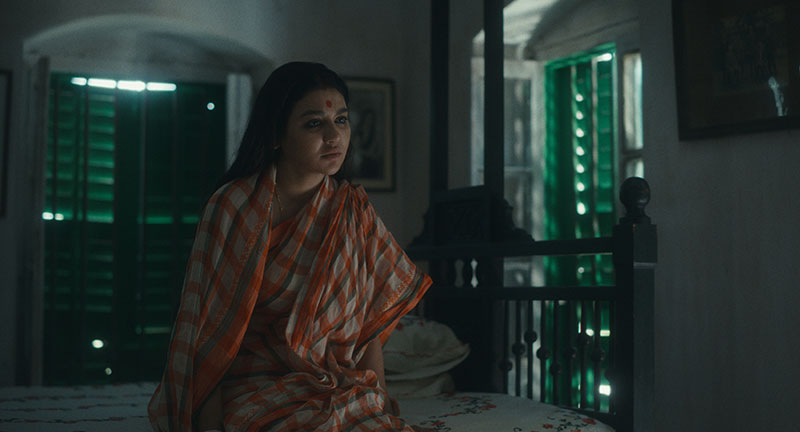
About the Crew
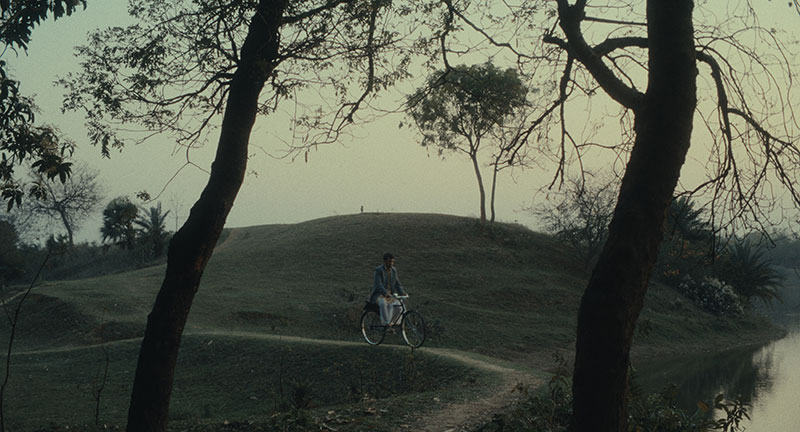
Manik Bandyopadhyay (Novelist): Manik is an Indian author (1908 – 1956) who is regarded as one of the major figures of 20th-century Bengali literature. Putulnacher Itikatha (1936) is one of his outstanding works. The Puppet’s Tale, under this title UNESCO sponsored an English translation of the novel.
Sayak Bhattacharya (Cinematographer): Graduating from Satyajit Ray Film and TV Institute of India Sayak’s school diploma film won the ‘Best Student Cinematography’ award at the Munich International Film Festival. He has worked with eminent directors like Majid Majidi and Amit Dutta, among others. Sayak won the IWM digital award for Best Cinematography in a Web Series for ASUR in 2021. His recent work Jamtara Season 2 is streaming on Netflix. His films are screened in Rotterdam, Oberhausen, Busan film festivals.
Tinni Mitra (Editor): Graduating from Satyajit Ray Film and TV Institute of India Tinni has won Best Editing for her film school diploma film at the National Film Awards. She is an alumnus of Berlinale Talents. She has been working in fiction and non-fiction since 2012 and has contributed to many award-winning and her films are screened at Busan, Karlovy Vary, Rotterdam, among others.
Prabuddha Banerjee (Music Director): Prabuddha Banerjee is a National Award winning music director and two-time Filmfare Award winner. Trained in Western Classical violin, he has developed into a multi-instrumentalist musician and composer. He has given music direction in 50 films so far.
Sidhart Meer: (Executive Producer): Sidhart and his Bridge PostWorks (post-production works) aim to always maintain cutting-edge DNA in every project undertaken. Which includes Academy Award Winner – The Elephant Whisperers along with Academy Award Nominee – All That Breathes, and features like Newton, Gamak Ghar and OTT series Jubilee, among others.
Suchismita Dasgupta: (Costumes): Suchismita is an eminent costume designer and this is one of the many collaborations with Suman Mukhopadhyay. She worked in Aneek Dutt’s Aparajito recently and worked with directors like Sujoy Ghosh, Kaushik Ganguly and Suman Ghosh.
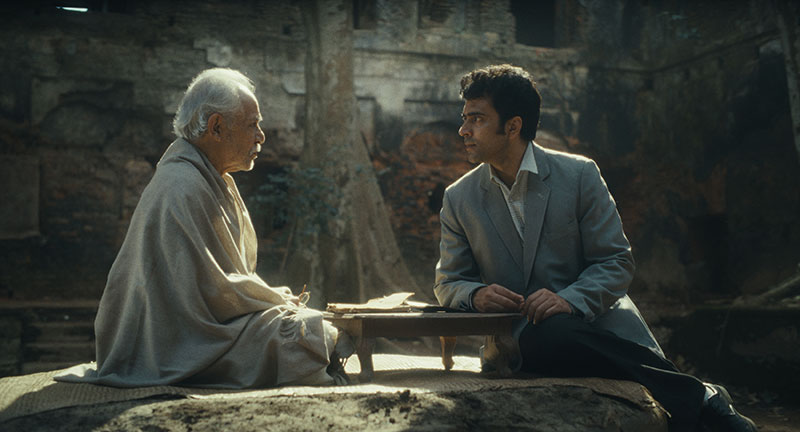
BIOGRAPHY
Suman Mukhopadhyay has directed eight full-length feature films: Putulnacher Itikatha (2024); Nazarband (2020); Asamapta (2017); Shesher Kobita (2014); Kangal Malsat, (2013); Mahanagar@Kolkata (2009); Chaturanga (2008) and Herbert (2005) which won the National Award for Best Regional Film that year. His films are screened in Munich, San Francisco, Busan, Toronto, India, Kerala, Kolkata International Film Festivals, among others.
Herbert (2006), Chaturanga (2008), Mahanagar@Kolkata (2010), Kangal Malsat (2013), Shesher Kobita (2013), Asamapta (2017), Posham Pa (2019), Nazarband (2020), Putulnacher Itikatha (2024)
I set out to create this film as an adaptation of Manik Bandyopadhyay’s 1936 novel Putulnacher Itikatha, believing it could have a therapeutic effect on the deadlock created by the vastly differing worldviews within our society today. The doctor’s dilemma becomes even more pressing in a context where death looms over everyone. What are the repercussions of his attempts at social reform? Shashi embodies a pessimism fueled by a yearning for intellectual engagement that eludes him in the confines of village life. He is trapped in a world where meaningful dialogue with his peers feels impossible. Despite his efforts to ‘reform’ what he perceives as a troubling native lifestyle, he finds himself met with frustration and futility. This adaptation aims to explore these themes, reflecting on the complexities of human connection and the challenges of enacting change in a resistant environment.
Suman Mukhopadhyay
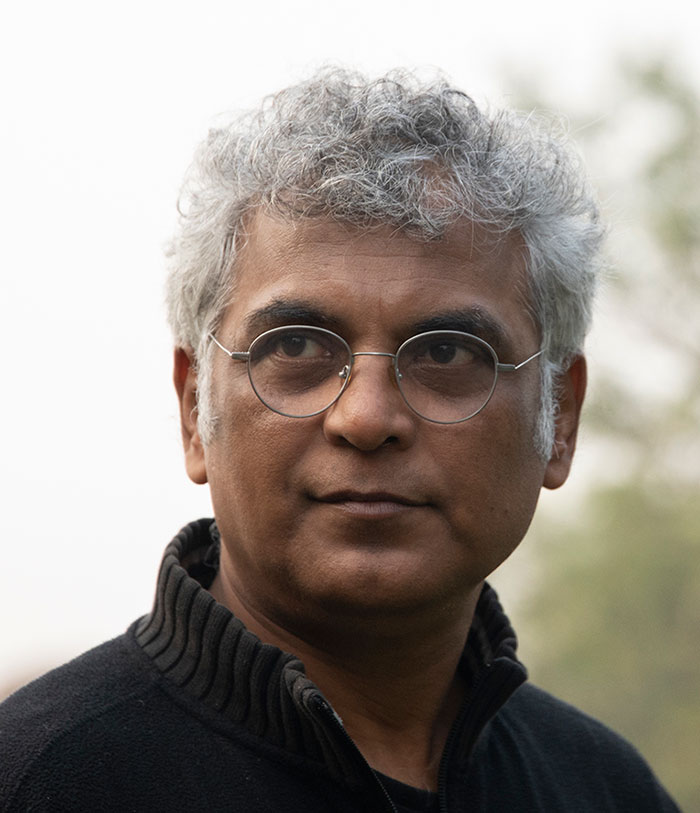
I struggled for 15 years to bring this film to life, revisiting the script as socio-political changes inspired new insights. Although I had no clear timeline for production, I traveled extensively to scout locations for this period piece. When the pieces finally fell into place with a producer on board, assembling the right cast and crew proved challenging. I sought a team that not only possessed acting and technical skills but also deeply understood the cultural milieu and moral values woven into the narrative.
To achieve this, I assembled a cast from both India and Bangladesh, emphasizing a shared understanding of the story’s context. I also immersed myself in literature from the era, encouraging my cast and cinematographer to read selected works to grasp the nuances of the time and space we aimed to depict.
In my cinematic interpretation, I focused on the character of Shashi, exploring his internal struggles. Rather than being a transformative agent, he embodies a tragic failure to act, remaining a passive observer in both love and significant social events.
Despite the story’s setting in an obscure and prejudiced rural environment, I found inspiration in the resilience of the women in the film. Kusum’s candid admission of her feelings for Shashi and Sendidi’s bold pregnancy serve as powerful counterpoints to the prevailing chauvinist social order, highlighting their strength and agency amidst adversity.
Samiran Das and his company Kaleidoscope has produced three feature films ‘Kedara’, ‘Bismillah’, ‘Putulnacher Itikatha’ and one short film – ‘Cold Fire’. ‘Kedara’ won the National Award and many other awards.


